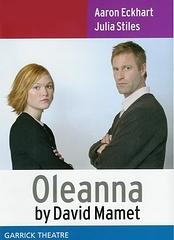Oleanna
David Mamet's play about a power struggle between a female student, who is floundering with her coursework, and her overbearing pretentious male professor is puerile almost to the point of derision. I always feel that there is a latent reactionary, dare I say misogynist agenda to Mamet's work, and sadly Oleanna only reaffirms my viewpoint.
Carol, a student fearing that she is about to fail her grades makes an impromptu visit to John, her college professor in his office. She is emotionally volatile, feeling vulnerable and foolish at her inability to comprehend her coursework. Her professor, while feigning empathy for her position, is in fact condescending; constantly interrupting her, always referring to himself, and using words he knows she will not understand.
In his attempts to help he offers to simplify the subject and guarantees he can make her a grade 'A' student if she will agree to meet with him privately in his office for tuition. He tells her that he wishes to establish a relationship free from the shackles of the teacher/student relationship and would like to be her friend. Finally he seeks to comfort her obvious distress by placing his hands on her shoulders.
In the second act, Carol is now behaving like a vociferate militant feminist who is out to disempower and destroy white, middle-class, male academics. She has accused the professor of sexual harassment, amongst other things, to the college tenure committee and appears to be jubilant in her new found power.
Mamet has a valid point in flagging the dangers of virulent PC (Political Correctness) madness. There is always the danger that PC can be misused so that the simplest signs of friendship and consideration by one human being for another can be misunderstood and even deliberately misused to destroy someone. An exploration of how stereotypical gender roles and institutionalised authority can lead to false accusations of abuse by either a real 'perpetrator' or a distraught 'victim', could prove a fruitful commentary on modern day sociological norms.
However, what we have here is a ridiculous plot in which one student's unproven claims, egged on by an unspecified feminist faction, means a college professor is in danger of losing his job and is being blackmailed to ban a list of politically incorrect books. Mamet seems to deliberately simplify the prejudice and obstacles that woman face in institutions that have for centuries been the bastions of male power. The plot is also incredulous, why for example does the professor continue to invite this wretched student back to his office?
At the end of the play, Carol tells the professor not to call his wife 'Babe'. This final preposterous demand drives the poor professor into a violent rage, a rage caused by the pressure of losing his job, home and possibly family, because of this young woman's unfounded allegations.
I found this last scene, particularly distasteful and cynical. Does Mamet want us to believe the assertions of a reactionary so called 'liberal' elite, that claims political correctness is all about emasculating men! And are we to conclude that Carol is deserving of the violence unleashed on her? That a man's violent and abusive behaviour can be excused because the woman drove him to it?
Throughout the first act Carol and the professor are continually interrupting each other, and when they do eventually speak some whole sentences, the telephone rings to further interrupt the proceedings. And if this is not annoying enough Mamet has the professor use terms like "The White Man's Burden", or describe the disciplinary committee that is investigating the charges of sexism as being full of "Good men, noble and true", oversimplifying even further the complex issues of language, prejudice and power.
Julia Stiles and Aaron Eckhart are the two Hollywood actors starring in this latest Mamet offering by director Lindsay Posner. Stiles gives an impressive performance as the distraught student Carol; she looks dispirited and distressed throughout the first act and portrays a strong-minded, belligerent accuser throughout the second. Sadly, the same cannot be said for Aaron Eckhart's characterisation of the professor. Throughout the first act the professor is meant to be forever interrupting his student Carol, however Eckhart appears to lack the confidence to do this. As a consequence the dialogue often sounds staggered as he waits for Stiles to finish her line before quickly intervening with his own.
This production of Oleanna will undoubtedly be a box-office success because fans will want to flock to see Stiles and Eckhart. However, I fear that they will be disappointed with the play itself. If this should be their first outing to the theatre, I cannot see any of them becoming regular theatregoers after watching this turgid, messy play.
What other critics had to say.....
NICHOLAS DE JONGH for THE EVENING STANDARD says, "Mamet's hysterical play abhors." MICHAEL BILLINGTON for THE GUARDIAN says, "Skilful thesis-drama." CHARLES SPENCER for THE DAILY TELEGRAPH says, "A gripping revival." BENEDICT NIGHTINGALE for THE TIMES says, " I feel safe in recommending this Oleanna to just about anyone."
External links to full reviews from popular press
The Guardian
Daily Telegraph
The Times
Originally published on
